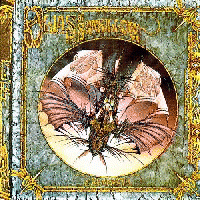
Album: Olias of Sunhillow
Artist: Jon Anderson
1976 Atlantic
CD Japan: AMCY-18
Band members:
Jon Anderson: all vocals and instruments
Written and Produced by Jon Anderson
Tracks:
1. Ocean Song (3:04)
2. Meeting (Garden of Geda) / Sound Out the Galleon (3:34)
3. Dance of the Raynart / Olias (To Build the Moorglade) (4:19)
4. Qoquaq En Transic / Naon / Transic To (7:08)
5. Flight of the Moorglade (3:24)
6. Solid Space (5:20)
7. Moon Ra / Chords / Song of Search (12:48)
8. To the Runner (4:29)
Notes: (****) Olias... is a concept album, telling a story loosely based on Roger Dean's cover to Fragile of Olias who builds a ship (the Moorglade) to rescue his people from a doomed planet. Anderson's first solo album was truly a solo album, written, performed and produced solely by Anderson. It was long been rumoured that Vangelis, then a regular collaborator of Anderson's, played on the album. The music does sound similar to some of Vangelis' work, but Vangelis himself has denied any involvement. This from a Sep 1977 interview in "Best":
When the record came out, the people of RCA with whom I am under contract invited me and told me it wasn't very nice to have played on the record, without warning. But that's ever more curious since I haven't played on it and they were convinced of having recognized my sound. I myself was very surprised it had my name on the thank you-list. Maybe I have influenced Jon, I don't know. And it's clear that it's closer to this than you get with Yes. But maybe it's a coincidence. In any case, it's a formidable feat there is such a record when it features like Jon a debutante on keyboards. I believe the record represents more the way he is than what he does with Yes, no offense intended.From the same magazine comes Anderson's own views on the album:
It was a very interesting experiment and to me very enriching as it forced me to learn, not to be satisfied with what I had been, to try to go beyond myself. When I did it the fact of being entirely in charge of what I made, being in control was more alluring than being under this control myself. Nothing or nobody claimed ownership of ideas, not even myself, they all occurred inside me. It is a fantastic experiment, one which enhances the personality enormously. At the beginning, I had only scant knowledge of keyboards or percussions, but I did not seek to play something so definite that it would have required a great technique, I let myself go and my ideas were bounded by the limits of my possibilities while always pushing these limits a little further back. "Olias of Sunhillow" is by far what gave me the most, speaking on the individual and personal level. Not that it should be a starting point for my future. I think that this experiment will be continued, in a few years undoubtedly. I had the feeling by doing this album to be on the right path. That doesn't mean to say that I don't believe in bands anymore, no. There is music which is done collectively and music which is done individually. When I make music for Yes, it is normal that it is Yes who play it, that's what it's made for. But when music is really personal, the ideal is to be able to carry it all by yourself. I could make "Olias" with musicians and the new record would undoubtedly be better, technically more successful, and I could still remake it and again still with others and it would always be different, but the idea of "Olias" which comes from me and which I like most would remain connected to the first album, this one that I've made, because it is closest to my idea and my feeling. I do not claim to be a master of the keyboards or percussions but I find that what I've pulled off attracts me and sounds right. What counts is not the technical ability, but the accuracy of what one does at the moment when it is done, however modest that might be. There is indeed at this moment a movement of solo-musicians but I believe that it only exists by virtue of the existence of the synthesizer. Without that, nothing would be possible. [...](Interviews found at http://www.elsew.com/data/best77.htm, translated from the French by Ivar de Vries.)
Still felt by many to be Anderson's best solo work, Olias...
has some of the same feel as Tales from Topographic Oceans in
its
expansiveness, but a very different instrumental palette.
The album has only rarely been performed live, although Anderson did
do one piece from the album at the 1979 Montreux Jazz Festival, on a
shared bill with Rick Wakeman and Steve Howe.
In the mid- to late-2000s, Anderson talked about a sequel album, The Songs of Zamran: Son of Olias.
It is unclear when a release may appear. (MP/HP, 29 Dec
03; revised HP, 31 Jan 09)